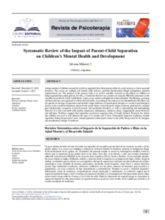A large number of children around the world are separated from their parents either by social services or due to parental decisions. The causes are multiple and include child violence, parental abandonment, illegal immigration, parental imprisonment, etc. The purpose of the present study is to review scientific research on the effects on children of being separated from their parents. For this, a Systematic Review was carried out using the PRISMA statement on the scientific bases DOAJ, Scielo and Redalyc. Open access articles in English have been included. The filtering, screening and final selection are expressed in a flowchart and tables. According to the analysis it was identified that the effects are not specific to the type of separation and include a high incidence of neurological changes as a result of psychological trauma, early sexual development, physical and sexual abuse, school dropout, subpar academic performance, strained peer relationships, symptoms of psychosomatic and psychiatric disorders, as well as internalizing and externalizing behavior. It is also associated with anxiety, depression, delinquency, substance abuse, inappropriate sexual behavior and self-harm. Evidence suggests that separation can lead to ongoing cycles of family division. Research has shown that children are most at risk between the ages of 9 months and 9 years. Particularly high-risk conditions include separation during the preschool years, abrupt separation without prior notice to the child, being cared for by strangers and simultaneous change of residence.

